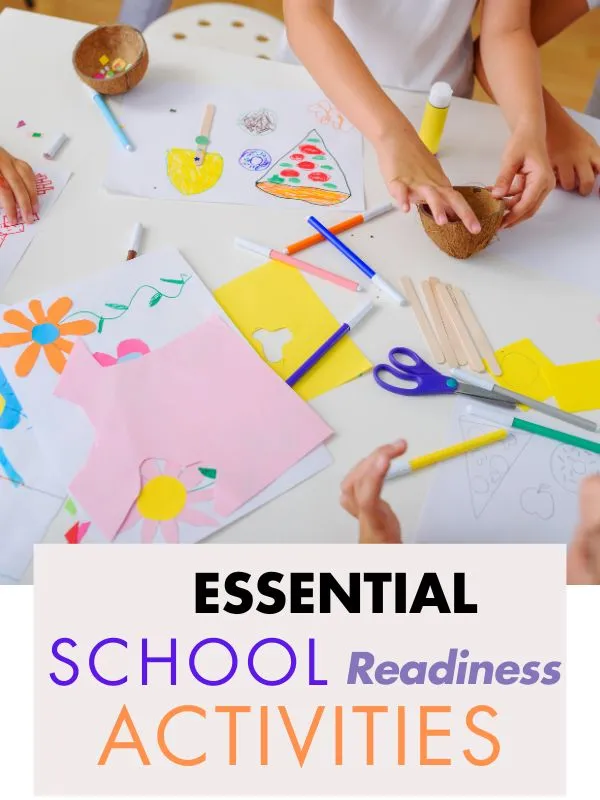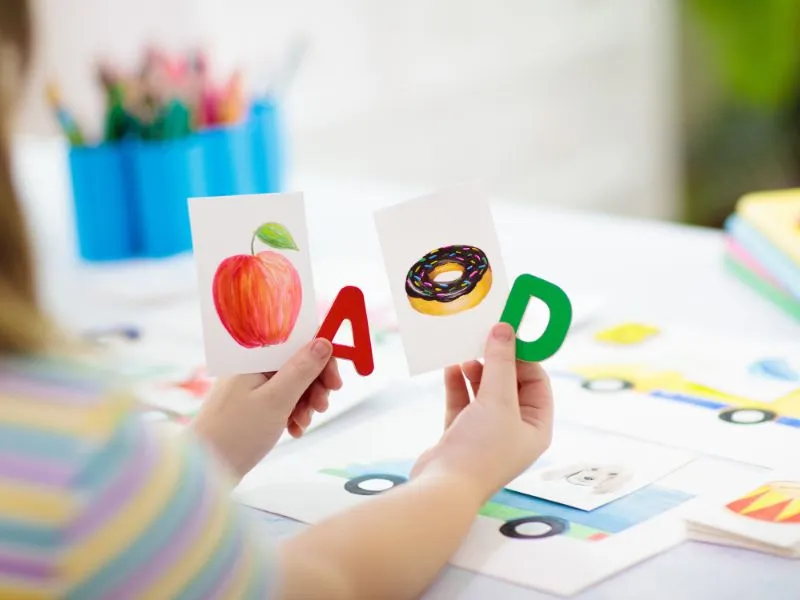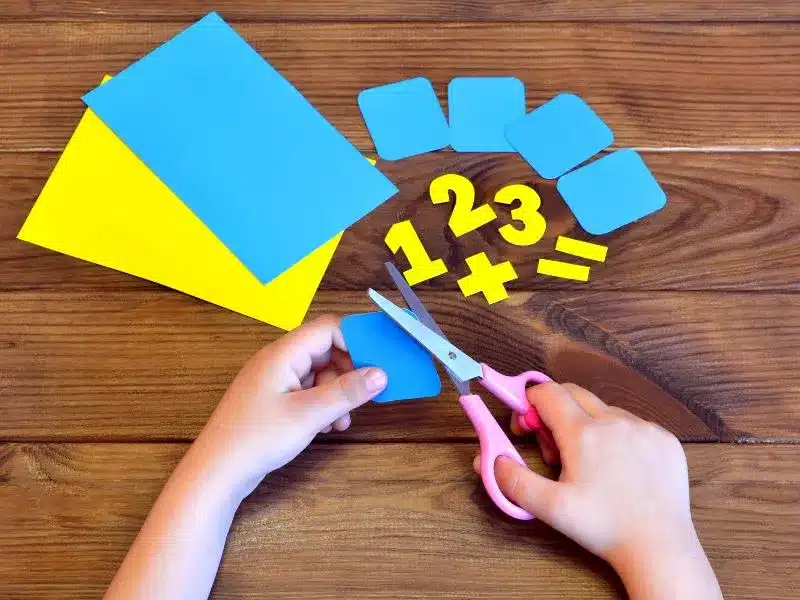ESSENTIAL SCHOOL READINESS ACTIVITIES FOR PRESCHOOLERS
Is your preschooler getting ready for “Big School” next year? These essential school readiness activities will help them have a smooth transition from preschool to big school.
School readiness doesn’t necessarily mean children should sit for a test to determine if they are ready for a formal educational setting.
Rather, it’s a set of skills children develop from birth and sharpen during kinder years.
These skills are going to determine a child’s maturity level in so many ways and their ability to cope with challenges related to the school environment.
Our article today focuses on school readiness activities that need to be done throughout their pre-school years in order to make them ready for their next big step.
What is School Readiness
As experts believe, “school readiness” is not something children can acquire in a month or so. It’s a long term process of acquiring a wide scope of skills, mainly through play.
Yes, you heard it right. It’s that simple. All school readiness activities are primarily based on play.
Key components of school readiness
The key components of school readiness include,
- Cognitive
- Social-emotional
- Language
- Physical development
- Self help skills

Cognitive Development Activities
Cognitive development activities involve a child’s logical thinking, reasoning and problem solving skills.
Following activities are ideal for school readiness.
- Problem-solving puzzles and games
- Memory and matching games
- Exploring cause and effect relationships-Ex: bubbles, button press toys, musical instruments
- Engaging in pretend play and imaginative activities – Ex: doll house, dress up, toy kitchen
Social-Emotional Development Activities
Following are the key components of Social-emotional skills that should be covered in school readiness activities.
- Encouraging self-regulation and emotional expression
- Practicing turn-taking and sharing
- Building empathy and understanding of others
Developing conflict resolution skills
Read more about Social-Emotional skills.
Language and Literacy Activities
So what are the school readiness activities for developing a child’s language and literacy?
Reading and storytelling
This is something you should be doing with your kids almost everyday.
Reading books can not only improve their language skills but also it fosters creativity, imagination and problem solving.
Do you want to know how to raise a reader?
Building vocabulary through conversation and word games
You can quickly build their vocabulary through conversation. Including new words in your conversation intentionally, in order to introduce a new concept is a good method.
Ex: If you want to introduce the word “Recycling”, intentionally bring out the word in everyday conversation. Encourage them to ask questions.
Fun word games like crossword puzzles, scrabbles or word searches are such an easy way to squeeze them into your activity list, yet they are so engaging and educational.

RECOGNIZING LETTERS AND THEIR SOUNDS
You can start teaching the alphabet as early as you like. The earlier the better. ABCD song is the best way to teach them the alphabet.
We all know how much kids like to sing songs so in no time they are going to learn the song.
Your next step is to give them visual stimulation parallel to the sound. Point at the letters as you sing the song.
As they grow up to be preschoolers, they will point at different letters and try to read or make meaningful sounds out of them.
Make sure you point at the word when you read books. Help them become familiar with words and sounds.
Check out Readingeggs for fun reading activities and to learn phonics, sight words and other literacy skills.
DEVELOPING PRE-WRITING SKILLS
Pre-writing skills are extremely important for a child to be ready for the challenging writing, drawing or sketching tasks ahead.
Pre-writing skills focus on strengthening the muscles in their hand, helping pencil grip and improving pencil control.
Examples of activities that develop pre-writing skills.
- Art and craft
- Drawing and painting
- Tearing papers
- Mud play
Math and Numeracy Activities
We can introduce math and numeracy activities with simple everyday objects like blocks, puzzles, rocks or twigs.
The toys they use every day can be incorporated into math and numeracy lessons if we can be a bit creative.
Things I use to teach basic math skills.
- Staircase – ideal for counting
- Rocks, twigs, blocks, toy cars – Counting ,sorting, categorising
- Assortment of natural objects, pieces of toys like pinecones, square blocks, wooden arches, rubber balls – To introduce basic patterns and shapes
- Measuring tools like cups and spoons – for teaching early measurement skills

Fine Motor Skills Activities
The following activities will help improve your child’s fine motor skills.
- Using scissors and practising cutting skills
- Drawing, colouring, and tracing shapes and lines
- Manipulating small objects, such as beads or buttons
- Strengthening hand muscles through playdough or clay activities
Read more about fine motor skills activities
Gross Motor Skills Activities
These activities will help your child develop gross motor skills.
- Running, jumping, and hopping games
- Balancing exercises, such as walking on a line or a balance beam
- Throwing, catching, and kicking balls
- Dancing or participating in movement-based activities
Activities To Develop Self Help Skills
Self-help skills can be broken down into many categories depending on how important they are to your daily life. Some common self help skills include,
- Using the toilet independently
- Using utensils properly
- Drinking from a cup or straw
- Putting on and taking off clothes independently
Read this comprehensive article on self help skills for toddlers to learn more in detail.
Strategies for Incorporating School Readiness Activities into Your Daily Routine

Creating a structured and consistent schedule
We already know that school readiness skills are primarily learned through play.
Independent play develops many essential skills in children like problem-solving skills, self-help skills etc.
However, to promote specific skills, structured play is also needed.
So while you encourage children to play independently, make sure you allocate time for structured play where you plan and promote a specific skill in children.
Ex: You plan an activity where children are given pompoms of different colours and sizes. Encourage children to sort them using tongs.
The other important thing to remember about school readiness activities is that they need to be consistent. Meaning your child needs to be doing at least a couple of these activities every day.
Making learning fun through play and hands-on activities
School readiness activities need to be fun and engaging. They need to be activity and play based all the time.
Make nature a part of their learning process. Bush walks, picnics, mudplay, camping, fruit picking are a part of their lives and help them learn new skills for connecting to nature.
Fostering a love for learning and curiosity
This is the most important part of learning. If you can spark that love and passion for learning and foster their curiosity about what is happening around us, that is going to nurture a life long passion for learning.
So basically, our target need not necessarily be to make our “children school-ready”. We need to try to spark that passion for learning and curiosity.
When your child asks questions about something, be excited to talk about it. If you don’t know how to answer that, try to find answers together.
Read books together, watch documentaries together or you can google.
Your excitement to learn new things is going to set an example for your kid.
Providing a supportive and stimulating environment
A supportive and stimulating environment is essential for children to grow up and acquire skills. In simple terms, we need to provide a safe space for our kids to build, create, recreate, pretend, take decisions, express their views, experiment, make mistakes and simply be the best version of themselves.
We are their home. So if they can have a supportive and stimulating environment to learn through different areas of play.
Conclusion
School readiness activities are activity and play based. They are fun, engaging and they ensure a smooth transition from preschool to big school.
I hope you found some great activities and tips to boost your preschooler’s confidence and skill level.
Please share your thoughts with us 🙂

Leave a Reply